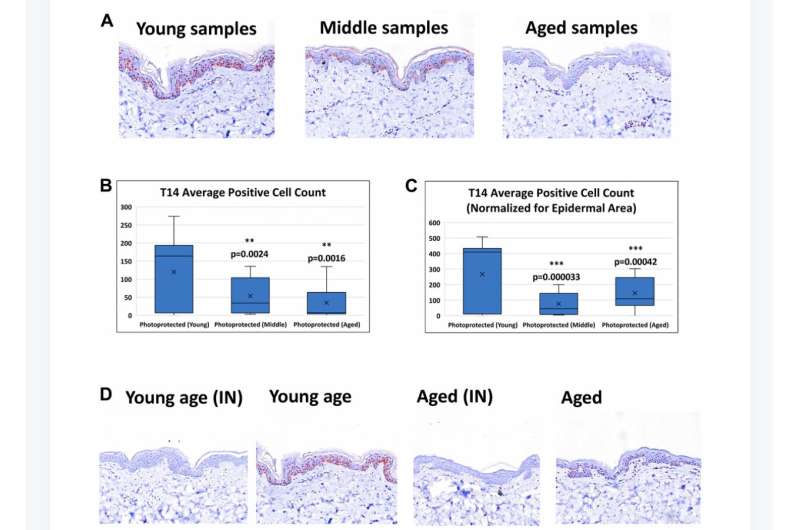This article has been reviewed according to Science X's editorial process and policies. Editors have highlighted the following attributes while ensuring the content's credibility:
fact-checked
proofread
A novel peptide 'T14' reflects age and photo-aging in human skin

A new research paper, titled "A novel peptide 'T14' reflects age and photo-aging in human skin," was published in Aging.
T14 is a 14mer peptide derived from the C-terminus of acetylcholinesterase (AChE). Once cleaved, it is independently bioactive of the parent molecule and enhances calcium influx in different cell types, in a range of scenarios: it binds to an allosteric site selectively on the alpha-7 receptor, where it modulates calcium influx and is thus a potential trophic agent, as already reported in a range of normal developmental scenarios. However, if inappropriately activated, this erstwhile beneficial effect converts to a toxic one, resulting in pathologies as disparate as Alzheimer's and various metastatic cancers.
In this new study, given that epidermal keratinocyte cells have the same ectodermal origin as brain cells, as well as expressing AChE and the alpha-7 receptor, researchers Sheila Rocha, Sara Garcia Ratés, Tumisang Moswete, Kristopher Kalleberg, Anna Villa, Jason P. Harcup, and Susan A. Greenfield from Unilever Research and Development and Neuro-Bio explored whether T14 plays a comparable role.
"The first aim of this study was therefore to see if T14-ir could be detected in keratinocytes using an antibody that would not recognize the parent AChE itself, and thus be readily differentiated from it. [...] Hence the second aim of the study was to investigate the possibility that T14 was not only present in keratinocytes but could be regarded as an index reflecting not just age but also photo-induced aging," say the researchers.
The team reports that the T14 immunoreactivity is detectable in human keratinocytes with levels inversely related to age: this decrease is even more apparent with chronic photo-exposure and thus accelerated skin aging. They concluded that T14, an agent promoting cell growth and renewal in other parts of the body, also operates in skin. Moreover, monitoring of keratinocyte T14 levels might offer further insights into the now well reported link between degenerative diseases and epidermal cell profile.
"Hence further exploration of the T14 system in the epidermis might prompt new insights into the treatment of hyperproliferative skin disorders, as well as into the mechanisms of normal skin age and aging," the authors conclude.
More information: Sheila Rocha et al, A novel peptide 'T14' reflects age and photo-aging in human skin, Aging (2023). DOI: 10.18632/aging.204844




















